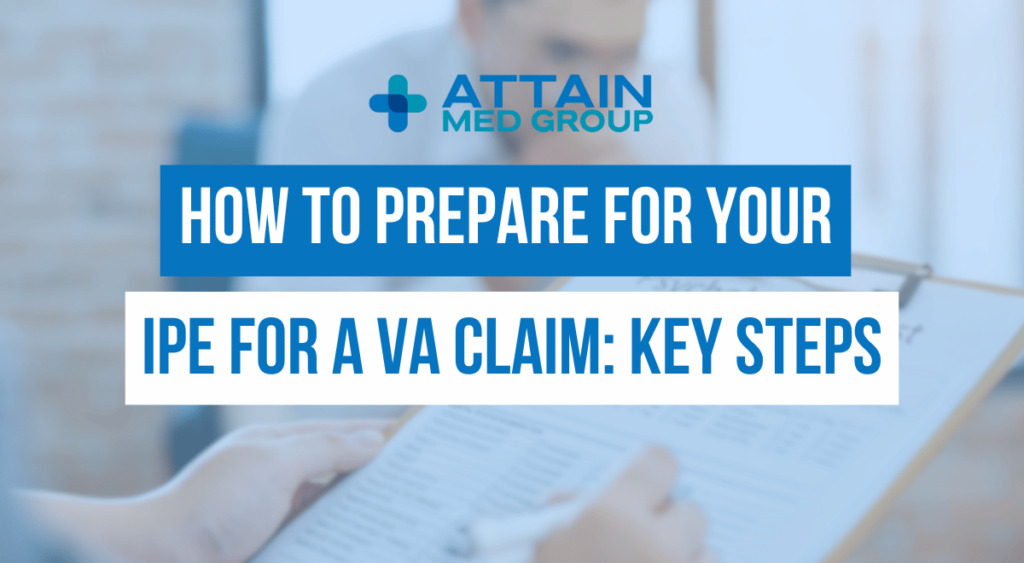Getting ready for an Independent Psychological Evaluation, or IPE, for your VA disability claim can feel like a big step. You might be wondering what it is, why it’s needed, and how best to approach it. Knowing How to Prepare for Your Independent Psychological Evaluation (IPE) for a VA Claim really does make a difference in making sure the evaluation captures what you’re going through.
Many veterans seeking disability benefits for mental health conditions like PTSD, depression, anxiety, or issues related to Military Sexual Trauma (MST) find themselves needing an IPE. This evaluation provides crucial medical evidence for your claim. Understanding How to Prepare for Your Independent Psychological Evaluation (IPE) for a VA Claim helps you present a clear picture of your condition and strengthen your overall VA claim.
What Exactly is an Independent Psychological Evaluation (IPE)?
So, what is this IPE thing anyway? Think of it as a detailed mental health check-up performed by a qualified psychologist or psychiatrist who isn’t directly employed by the VA system full-time. Their job is to give an objective medical opinion about your mental health condition related to your VA disability claim.
The evaluation usually involves meeting the examiner for an interview where you discuss your background, military service, symptoms, and how your condition affects your daily life. Sometimes, you might also fill out questionnaires or complete psychological tests. The goal of these psychological evaluations is to gather comprehensive information about your mental health.
This psychological examination is independent, meaning the IPE evaluator aims to provide an unbiased assessment based on their clinical expertise and the evidence provided. They review relevant records and then talk with you to understand your situation. The final report they write can become a key piece of medical evidence in your VA claims file, potentially impacting your disability rating.
It’s important to note that an IPE differs from a standard VA Compensation & Pension (C&P) exam. While both are medical exams used in VA claims, the IPE is conducted by a professional outside the regular VA system, offering a separate, objective perspective. The psychologist selected for the IPE is chosen for their expertise in assessing mental health conditions.

Why an IPE Matters for Your VA Claim
An IPE can be incredibly valuable for your VA disability claim, especially for mental health conditions. These conditions, often stemming from stressful military service experiences leading to conditions like stress disorder, are frequently ‘invisible’. This makes objective medical evidence really important for establishing the reality and severity of the mental disorder.
A thorough IPE report gives the VA detailed information from a qualified health professional. For conditions like Post-Traumatic Stress Disorder (PTSD), major depressive disorder, anxiety disorders, or the lasting effects of MST, an independent psychological examination helps connect the dots. It can provide strong evidence linking your current diagnosis and symptoms to your time in service.
This connection, often formalized in documents similar to nexus letters, is vital for establishing service connection for your VA disability. The IPE report details the severity of your symptoms and, critically, how they impact your ability to function day-to-day. This functional impairment is a major factor the VA considers when assigning a disability rating for disability benefits.
A well-documented IPE, offering a clear medical opinion, strengthens your case significantly compared to relying solely on VA medical records or a brief C&P exam. It provides depth and context that can be very persuasive. The independent nature of the psychological exam adds credibility to the findings presented.
Getting Ready: Your Pre-IPE Checklist
Walking into an IPE without any preparation might leave you feeling flustered. You could forget important details or struggle to explain the true impact of your mental health condition. Taking some time beforehand to get organized can make a world of difference for your psychological evaluation.
Think of it like gathering information for an important meeting, where the subject is you and your experiences related to your VA disability claim. This isn’t about memorizing answers, but about collecting your thoughts and relevant evidence. Proper preparation helps you communicate clearly and confidently during the independent psychological examination.
Let’s break down the practical steps you can take. These actions help make sure you cover all the bases during your psychological exam. They empower you to present the most accurate information about your mental health conditions.
Gather Your Records
Before your appointment, reviewing your own records is very helpful. This includes your Service Treatment Records (STRs), which document your health during your military service. Look for any documentation related to physical injuries, events, or mental health concerns during your service, as sometimes physical-mental injury connections exist.
Also, go through your VA medical records and any records from private healthcare providers or therapists you’ve seen since leaving the military. Seeing the timeline, notes from your treating physician, and previous diagnoses helps refresh your memory. It also helps you guide the IPE evaluator to relevant medical history concerning your health condition.
Having these details fresh in your mind allows you to speak accurately about your health journey, including both mental disorders and any relevant physical injuries. You don’t usually need to bring stacks of paper, but knowing what’s documented is powerful. Check if the evaluator or the service coordinating the IPE wants copies of anything specific beforehand.

Document Your Symptoms and Experiences
Memory can be tricky, especially when discussing stressful topics related to your mental health condition. That’s why writing things down before your independent psychological evaluation is a great idea. Make a list of your current symptoms – mental, emotional, and even physical ones that might be related to your mental health, like fatigue or pain exacerbated by stress.
Think about specific examples for each symptom. Instead of just saying “I have anxiety,” maybe note “I experience sudden panic attacks in crowded stores, happening about twice a week, where my heart races, I sweat, and I feel like I can’t breathe or escape.” Include details about frequency (how often?), duration (how long?), and intensity (how severe?) for your mental health conditions.
Jot down key traumatic events or difficult periods from your military service if they relate to your condition. Note when your symptoms first started or got noticeably worse after leaving service. This timeline helps the evaluator understand the progression of your health conditions and link them back to your service.
Focus on Functional Impact – This is Big
This part is super important for the VA when processing disability claims. They need to understand how your condition affects your everyday life and overall functioning. This is often called ‘functional impairment‘ or ‘functional impact‘, and it directly influences your potential disability rating.
Think about different areas of your daily life. How does your condition impact your ability to work, maintain employment, or perform job duties? Does it affect your relationships with family or friends, your ability to socialize, or your participation in community activities? Consider impacts on daily tasks like concentration, memory, following instructions, managing finances, personal hygiene, or even leaving the house.
Be specific here too, providing concrete examples. For instance, “Because of my depression, I often lack the energy and motivation to shower daily or keep my living space tidy, which causes friction with my family.” Or, “My PTSD-related hypervigilance makes it hard to be in noisy environments like restaurants or grocery stores, so I avoid most social gatherings and feel isolated.” Clearly explaining these impacts helps the IPE evaluator, and ultimately the VA, grasp the true severity of your mental health condition.
Understand the Evaluator’s Role
It helps to remember who the IPE evaluator is and what their role involves. They are licensed mental health professionals, typically psychologists or psychiatrists, selected for their expertise. Their task is to conduct an objective psychological evaluation based on their clinical judgment, the information you provide, and the records they review.
They are independent healthcare professionals. While the VA might request the IPE, or you might seek one through a veteran advocacy group or legal representative, the evaluator isn’t there to “approve” or “deny” your VA disability claim. They are there to assess your condition and provide a professional medical opinion in a detailed report.
Knowing this can help reduce anxiety about the appointment. They are trained healthcare providers skilled at listening and asking questions to understand your mental health situation. Your role is to provide honest and detailed information to help them conduct a thorough and accurate psychological examination.

How to Prepare for Your Independent Psychological Evaluation (IPE) for a VA Claim: The Appointment
Once you’ve done your preparation, the next step is the evaluation itself. Knowing how to approach this conversation is just as important as the prep work. It’s your chance to share your story and experiences directly with the health professional.
Feeling nervous is completely normal, given the importance of the independent psychological evaluation for your VA disability benefits. Remember, the goal is simply to provide an accurate picture of your condition and how it affects your daily life. Your preparation will serve as your guide during the meeting.
Being honest and detailed are the keys during the evaluation. The IPE involves meeting the examiner, and you want to make the most of that time. Let’s explore what that looks like and what you might expect during the appointment itself.
During the Evaluation: Honesty and Detail are Your Allies
This is not the time to downplay your symptoms or put on a brave face, thinking it shows strength. The evaluator needs to understand the full extent of your struggles to provide an accurate assessment for your VA disability claim. Be open and honest about everything you’re experiencing regarding your mental health condition, even if it feels difficult or embarrassing to talk about.
Provide details whenever possible. Instead of making generalizations, use the specific examples you thought about earlier. Describe what your worst days look like, how often they occur, and contrast that with your average days to show the range of your experience.
Don’t worry about sounding ‘weak’ or ‘complaining’; the purpose of this medical exam is specifically to understand your impairments and how they affect you. Sharing the full picture gives the evaluator the information they need to write an accurate and helpful report. Consistency between your statements, your history, and your records is also important.
Communicating Your Struggles Effectively
You’ve done the work of gathering your thoughts and notes; now it’s time to use them during the independent psychological examination. Referencing your notes briefly can help you stay on track if you get nervous or lose your train of thought. It helps you mention the key points you wanted to cover about your mental disorders.
Explain how specific symptoms impact specific areas of life. Use “I” statements to make it personal and clear: “I struggle to sleep more than 3 hours most nights because of nightmares related to my service, leaving me exhausted during the day,” or “I lost my last job because my concentration was so poor I kept making mistakes…” Connect the symptom directly to a real-life consequence relevant to your VA claim.
Be clear about how often symptoms occur (frequency) and how severe they feel (intensity). This helps the healthcare professional differentiate between occasional bad days, which everyone has, and persistent, impairing conditions that warrant disability benefits. Good communication during the psychological exam leads to a clearer evaluation and a stronger report.

What to Expect During the Appointment
Most independent psychological examinations follow a similar structure. You’ll likely start by discussing your background, including family history, education, work history, and, importantly, your military service experiences. Then, the focus will shift more specifically to your current symptoms and mental health concerns.
The IPE evaluator will ask a lot of questions; this is a normal part of the diagnostic interview process as they gather necessary information. Sometimes, they might administer standardized questionnaires or psychological tests. These tools provide objective data about your symptoms, cognitive functioning, or personality traits, supplementing the interview information.
The length of the evaluation can vary but often lasts anywhere from one to several hours, depending on the complexity of your case. Treat it as a professional medical appointment. The evaluator should explain the process clearly and aim to create an environment where you feel reasonably comfortable sharing your personal experiences relevant to your VA disability claim.
After the IPE: What Happens Next?
Once the independent psychological evaluation appointment is complete, the work isn’t over for the IPE evaluator. The psychologist selected will then analyze the information gathered from the interview, your records, and any testing performed. They compile this into a comprehensive written report.
This report typically includes your background, a summary of your relevant military service, your reported symptoms, diagnoses based on clinical findings, and crucially, a medical opinion on the connection between your condition and your service (service connection). It will also detail the severity of your symptoms and their impact on your functioning in various areas of life.
The completed report is then usually sent either directly to the VA, if they ordered the IPE, or to your representative (like an attorney or claims agent) if you sought the evaluation independently. This report becomes critical medical evidence within your VA claims file. The VA rating officials will review this independent medical opinion alongside other evidence when making a decision on your disability claim and assigning a disability rating.
How Attain Med Group Supports Your IPE Journey
Understanding the VA claim process and preparing for evaluations like an IPE can feel complex. That’s where organizations like Attain Med Group can step in. We work closely with veterans to help clarify this process.
We help you understand exactly what an independent psychological evaluation involves and guide you on how to best prepare. Our team assists you in organizing your thoughts and identifying relevant evidence. We want you to feel prepared so the evaluation fully reflects your condition and its impact.
Attain Med Group partners with qualified, independent healthcare professionals who conduct these crucial psychological evaluations. We focus on facilitating thorough evaluations that use VA-accepted language and directly address the functional impact of your health condition. Our goal is to help you feel supported and confident, knowing you are presenting strong medical evidence for your disability claims, potentially speeding up access to your disability benefits.

Conclusion
Preparing for your Independent Psychological Evaluation doesn’t have to add extra stress to your VA disability claim process. By understanding its purpose, gathering your thoughts and medical records, and focusing on honestly conveying the functional impact of your mental health condition, you position yourself for a productive appointment. Remember, the IPE evaluator needs accurate, detailed information to form their medical opinion.
Taking the time for How to Prepare for Your Independent Psychological Evaluation (IPE) for a VA Claim is an investment in the potential success of your VA claims. It helps make sure the final report from the psychological examination truly reflects the severity and reality of the mental disorder you live with daily. With thoughtful preparation, you can approach your IPE confidently.

